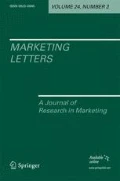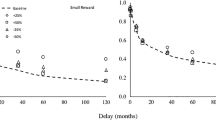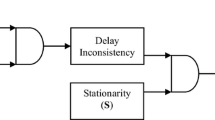Abstract
Research in intertemporal choice has been done in a variety of contexts, yet there is a remarkable consensus that future outcomes are discounted (or undervalued) relative to immediate outcomes. In this paper, we (a) review some of the key findings in the literature, (b) critically examine and articulate implicit assumptions, (c) distinguish between intertemporal effects arising due to time preference versus those due to changes in utility as a function of time, and (d) identify issues and questions that we believe serve as avenues for future research.
Similar content being viewed by others
References
Ainslie, G. (1992), Picoeconomics: The Strategic Interaction of Successive Motivational States within the Person. New York: Cambridge University Press.
Ainslie, G., and Nick Haslam. (1992), “Hyperbolic Discounting.” In George Loewenstein and Jon Elster (eds.), Choice Over Time, New York: Russell Sage Foundation, pp. 57–92.
Akerlof, George A. (1991), “Procrastination and Obedience,” American Economic Review 81(2), 1–19.
Ariely, Dan and Ziv Carmon (2003), “Summary Assessment of Experiences: The Whole Is Different from the Sum of Its Parts.” In Loewenstein, Read, and Baumeister, (eds.), Time and Decision, 323–350.
Ariely, Dan, and George Loewenstein. (2004). “In the Heat of the Moment,” working paper, Carnegie Mellon University.
Benzion, Uri, Ammon Rapoport, and Joseph Yagil (1989), “Discount Rates Inferred From Decision: An Experimental Study,” Management Science 35, 270–284.
Bickel, W. K. and Johnson. (2003), “Delay Discounting: A Fundamental Behavioral Process of Drug Dependence.” In Loewenstein, Read, and Baumeister, (eds.), Time and Decision, 419–440.
Block, R. A. and D. Zakay. (1997). “Prospective and Retrospective Duration Judgments: A Meta-Analytic Review,” Psychonomic Bulletin & Review 4(June), 184–197.
Chapman, Gretchen.B. (2003). “Time Discounting of Health Outcomes.” In Loewenstein, Read, and Baumeister, (eds.), Time and Decision, pp. 395–418.
Elster, J. (1979). Ulysses and the Sirens. Cambridge: Cambridge University Press.
Frederick, S. (1999). Discounting, Time Preference and Identity, doctoral dissertation, Carnegie Mellon University.
Frederick, S., George Loewenstein, and T. O'Donoghue. (2003). “Time discounting and time preference: a critical review.” In Loewenstein, Read, and Baumeister, (eds.), Time and Decision, 13–86.
Freud, S. (1933). “The Dissection of the Psychical Personality.” In Freud, A. (ed.), The Essentials of Psychoanalysis, London: Penguin.
Hausman, J. (1979). “Individual Discount Rates and the Purchase and Utilization of Energy-Using Durables,” Bell Journal of Economics 10(1), 33–54.
Hoch, S. J., and George F. Loewenstein. (1991), “Time-Inconsistent Preferences and Consumer Self-Control,” Journal of Consumer Research 17(March), 492–507
Hornik, J. (1984). “Subjective vs. Objective Time Measures: A Note on the Perception of Time in Consumer Behavior,” Journal of Consumer Research 11(June), 615–618.
Kahneman, D. (1999). “Objective Happiness.” In D. Kahneman, E. Diener and N. Schwarz (Eds.): Well-Being: Foundations of Hedonic Psychology. New York: Russell Sage Foundation Press, 3–27.
Katz, K., Blaire Larson, and Richard Larson. (1991). “Prescriptions for the Waiting-in-Line Blues: Entertain, Enlighten and Engage,” Sloan Management Review 32(Winter), 44–53.
Kirby, K. N., and Richard J. Herrnstein. (1995). “Preference Reversals Due to Myopic Discounting of Delayed Reward,” Psychological Science 6(2), 83–89.
Kirby, K. N. (1997). “Bidding on the Future: Evidence Against Normative Discounting of Delayed Rewards,” Journal of Experimental Psychology-General 126(1), 54–70.
Laibson, D. (1997). “Golden Eggs and Hyperbolic Discounting,” The Quarterly Journal of Economics 112(May)(2), 443–477.
Li, X. (2005). “Cakes, Women and Discount Rates: The Out-of-Domain Effect of Motivationally Appetitive Stimuli,” working paper, Rotman Business School, University of Toronto.
Liberman, N. and Y. Trope. (2000). “Time-Dependent Changes in Preferences,” Journal of Personality and Social Psychology 79, 876–889.
Loewenstein, G. (1987). “Anticipation and the Valuation of Delayed Consumption,” The Economic Journal 97, 666–684
Loewenstein, G. (1988). “Frames of Mind in Inter-Temporal Choice,” Management Science 34(2), 200–214.
Loewenstein, G. (1996), “Out of Control: Visceral Influences on Behavior,” Organizational Behavior and Human Decision Processes 65(3), 272–292.
Loewenstein, G. and David Prelec. (1991). “Negative Time Preferences,” American Economic Review 81:2(May), 347–352.
Mazur, J. E. (1987). “An Adjustment Procedure for Studying Delayed Reinforcement.” In Michael L. Commons, James E, Mazur, John A. Nevin and Howard Rachlin (eds.), The Effect of Delayed and Intervening Events on Reinforcement Value. Hillsdale, N.J.: Erlbaum.
Metcalfe, J. and W. Mischel. (1999). “A Hot/Cool-System Analysis of Delay of Gratification: Dynamics of Willpower,” Psychological Review 106, 3–19.
Mischel, W. and E. Staub. (1965). “Effects of Expectancy on Working and Waiting for Larger Rewards,” Journal of Personality and Social Psychology 2, 625–633.
O'Donoghue, T. and Matthew Rabin. (1999). “Doing It Now or Doing It Later,” The American Economic Review 89(1), 103–121.
Read, D. and B.van Leeuwen. (1998). “Predicting Hunger: The Effects of Appetite and Delay on Choice,” Organizational Behavior and Human Decision Processes 76(2), 189–205.
Read, D. (2001). “Is Time-Discounting Hyperbolic or Subadditive?” Journal of Risk and Uncertainty 23, 5–32.
Read, D. (2004). “Intertemporal Choice.” In D. Koehler and N. Harvey (eds.), Blackwell Handbook of Judgment and Decision Making. Oxford: Blackwell.
Rook, D. W. (1987). “The Buying Impulse,” Journal of Consumer Research 14(September), 189–199
Samuelson, D. (1937). “A Note on the Measurement of Utility,” Review of Economic Studies 4, 155–161.
Schelling, T. C. (1984). “Self-Command in Practice, in Policy, and in a Theory of Rational Choice. American Economic Review,” AEA Papers and Proceedings 74(2), 1–11
Soman, D. (1998). “The Illusion of Delayed Incentives: Evaluating Future Effort-Monetary Transactions,” Journal of Marketing Research 35(4), 427–237.
Soman, D. (2004). “The Effect of Time Delay on Multi-attribute Choice,” Journal of Economic Psychology 25, 153–175.
Soman, D. and Wenjing L. (2004). “The Discounting of Effort,” working paper, Rotman Business School, University of Toronto.
Strotz, R. H. (1955). “Myopia and Inconsistency in Dynamic Utility Maximization,” Review of Economic Studies 23(2), 165–180.
Thaler, R. H. (1981). “Some Empirical Evidence on Dynamic Inconsistency,” Economic Letters 8, 201–207.
Thaler, R. H. and Hersh M. S. (1981). “An Economic Theory of Self-Control,” Journal of Political Economy 89(2), 392–406.
Trope, Y. and N. Liberman. (2003). “Temporal Construal,” Psychological Review 110, 401–421.
Wertenbroch, Klaus. (1998). “Consumption Self-Control by Rationing Purchase Quantities of Virtue and Vice,” Marketing Science 17(4), 317–337.
Wilson, M. and M. Daly. (2003). “Do Pretty Women Inspire Men to Discount the Future?” Biology Letters (Proc. The Royal Society. Lond. B; Suppl., DOI 10.1098/rsbl. 2003.0134, online 12/12/2003)
Zauberman, G. (2003). “The Intertemporal Dynamics of Consumer Lock-In,” Journal of Consumer Research 30(3), 405–419.
Zauberman, G., James R. Bettman, and Selin A. Malkoc. (2005). “Time Horizon Neglect: Prospective Duration Insensitivity in Consumer Preference,” Working paper, The University of North Carolina at Chapel-Hill.
Zauberman, G. and John G. Lynch, Jr. (2005). “Resource Slack and Discounting of Future Time versus Money,” Journal of Experimental Psychology: General 134(1), 23–37.
Author information
Authors and Affiliations
Corresponding author
Rights and permissions
About this article
Cite this article
Soman, D., Ainslie, G., Frederick, S. et al. The Psychology of Intertemporal Discounting: Why are Distant Events Valued Differently from Proximal Ones?. Market Lett 16, 347–360 (2005). https://doi.org/10.1007/s11002-005-5897-x
Issue Date:
DOI: https://doi.org/10.1007/s11002-005-5897-x




